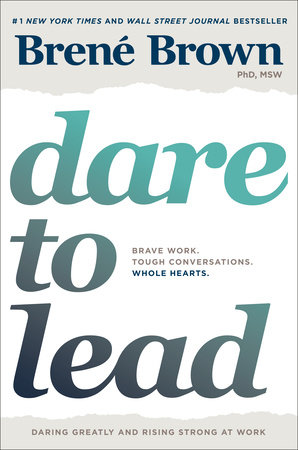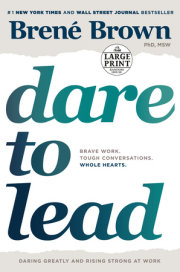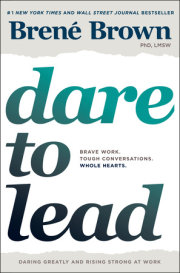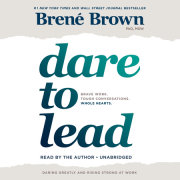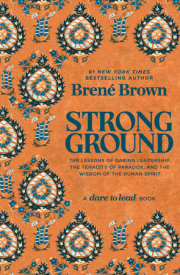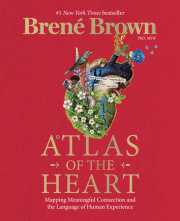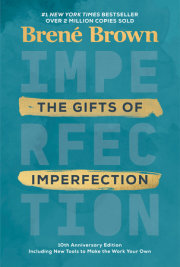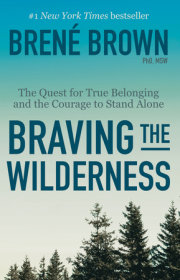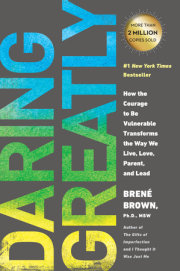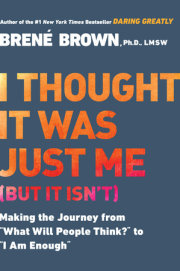The Moment and the Mythsthe moment the universe put the Roosevelt quote in front of me, three lessons came into sharp focus. The first one is what I call “the physics of vulnerability.” It’s pretty simple: If we are brave enough often enough, we will fall. Daring is not saying “I’m willing to risk failure.” Daring is saying “I know I will eventually fail, and I’m still all in.” I’ve never met a brave person who hasn’t known disappointment, failure, even heartbreak.
Second, the Roosevelt quote captures everything I’ve learned about vulnerability. The definition of vulnerability as the emotion that we experience during times of uncertainty, risk, and emotional exposure first emerged in my work two decades ago, and has been validated by every study I’ve done since, including this research on leadership. Vulnerability is not winning or losing. It’s having the courage to show up when you can’t control the outcome.
We’ve asked thousands of people to describe vulnerability to us over the years, and these are a few of the answers that directly pierce the emotion: the first date after my divorce, talking about race with my team, trying to get pregnant after my second miscarriage, starting my own business, watching my child leave for college, apologizing to a colleague about how I spoke to him in a meeting, sending my son to orchestra practice knowing how badly he wants to make first chair and knowing there’s a really good chance he will not make the orchestra at all, waiting for the doctor to call back, giving feedback, getting feedback, getting fired, firing someone.
Across all of our data there’s not a shred of empirical evidence that vulnerability is weakness.
Are vulnerable experiences easy? No.
Can they make us feel anxious and uncertain? Yes.
Do they make us want to self-protect? Always.
Does showing up for these experiences with a whole heart and no armor require courage? Absolutely.
The third thing I learned has turned into a mandate by which I live: If you are not in the arena getting your ass kicked on occasion, I’m not interested in or open to your feedback. There are a million cheap seats in the world today filled with people who will never be brave with their lives but who will spend every ounce of energy they have hurling advice and judgment at those who dare greatly. Their only contributions are criticism, cynicism, and fearmongering. If you’re criticizing from a place where you’re not also putting yourself on the line, I’m not interested in what you have to say.
We have to avoid the cheap-seats feedback and stay armor-free. The research participants who do both of those well have one hack in common: Get clear on whose opinions of you matter.
We need to seek feedback from those people. And even if it’s really hard to hear, we must bring it in and hold it until we learn from it. This is what the research taught me:
Don’t grab hurtful comments and pull them close to you by rereading them and ruminating on them. Don’t play with them by rehearsing your badass comeback. And whatever you do, don’t pull hatefulness close to your heart.
Let what’s unproductive and hurtful drop at the feet of your unarmored self. And no matter how much your self-doubt wants to scoop up the criticism and snuggle with the negativity so it can confirm its worst fears, or how eager the shame gremlins are to use the hurt to fortify your armor, take a deep breath and find the strength to leave what’s mean-spirited on the ground. You don’t even need to stomp it or kick it away. Cruelty is cheap, easy, and chickenshit. It doesn’t deserve your energy or engagement. Just step over the comments and keep daring, always remembering that armor is too heavy a price to pay to engage with cheap-seat feedback.
Again, if we shield ourselves from all feedback, we stop growing. If we engage with all feedback, regardless of the quality and intention, it hurts too much, and we will ultimately armor up by pretending it doesn’t hurt, or, worse yet, we’ll disconnect from vulnerability and emotion so fully that we stop feeling hurt. When we get to the place that the armor is so thick that we no longer feel anything, we experience a real death. We’ve paid for self-protection by sealing off our heart from everyone, and from everything—not just hurt, but love.
No one captures the consequences of choosing that level of self-protection over love better than C. S. Lewis:
To love at all is to be vulnerable. Love anything, and your heart will certainly be wrung and possibly be broken. If you want to make sure of keeping it intact, you must give your heart to no one, not even to an animal. Wrap it carefully round with hobbies and little luxuries; avoid all entanglements; lock it up safe in the casket or coffin of your selfishness. But in that casket—safe, dark, motionless, airless—it will change. It will not be broken; it will become unbreakable, impenetrable, irredeemable.
To love is to be vulnerable.
Rumble Tool: The Square Squad
When we define ourselves by what everyone thinks, it’s hard to be brave. When we stop caring about what anyone thinks, we’re too armored for authentic connection. So how do we get clear on whose opinions of us matter?
Here’s the solution we shared in Daring Greatly: Get a one-inch by one-inch piece of paper and write down the names of the people whose opinions of you matter. It needs to be small because it forces you to edit. Fold it and put it in your wallet. Then take ten minutes to reach out to those people—your square squad—and share a little gratitude. You can keep it simple: I’m getting clear on whose opinions matter to me. Thank you for being one of those people. I’m grateful that you care enough to be honest and real with me.
If you need a rubric for choosing the people, here’s the best I have: The people on your list should be the people who love you not despite your vulnerability and imperfections, but because of them.
The people on your list should not be “yes” people. This is not the suck-up squad. They should be people who respect you enough to rumble with the vulnerability of saying “I think you were out of your integrity in that situation, and you need to clean it up and apologize. I’ll be here to support you through that.” Or “Yes, that was a huge setback, but you were brave and I’ll dust you off and cheer you on when you go back into the arena.”
The Four Six Myths of Vulnerability
In
Daring Greatly, I wrote about four myths surrounding vulnerability, but since I’ve brought the courage-building work into organizations and have been doing it with leaders, the data have spoken, and there are clearly six misguided myths that persist across wide variables including gender, age, race, country, ability and culture.
Myth #1: Vulnerability is weakness.
It used to take me a long time to dispel the myths that surround vulnerability, especially the myth that vulnerability is weakness. But in 2014, standing across from several hundred military special forces soldiers on a base in the Midwest, I decided to stop evangelizing, and I nailed my argument with a single question.
I looked at these brave soldiers and said, “Vulnerability is the emotion that we experience during times of uncertainty, risk, and emotional exposure. Can you give me a single example of courage that you’ve witnessed in another soldier or experienced in your own life that did not require experiencing vulnerability?”
Complete silence. Crickets.
Finally, a young man spoke up. He said, “No, ma’am. Three tours. I can’t think of a single act of courage that doesn’t require managing massive vulnerability.”
I’ve asked that question now a couple of hundred times in meeting rooms across the globe. I’ve asked fighter pilots and software engineers, teachers and accountants, CIA agents and CEOs, clergy and professional athletes, artists and activists, and not one person has been able to give me an example of courage without vulnerability. The weakness myth simply crumbles under the weight of the data and people’s lived experiences of courage.
Copyright © 2018 by Brené Brown. All rights reserved. No part of this excerpt may be reproduced or reprinted without permission in writing from the publisher.

